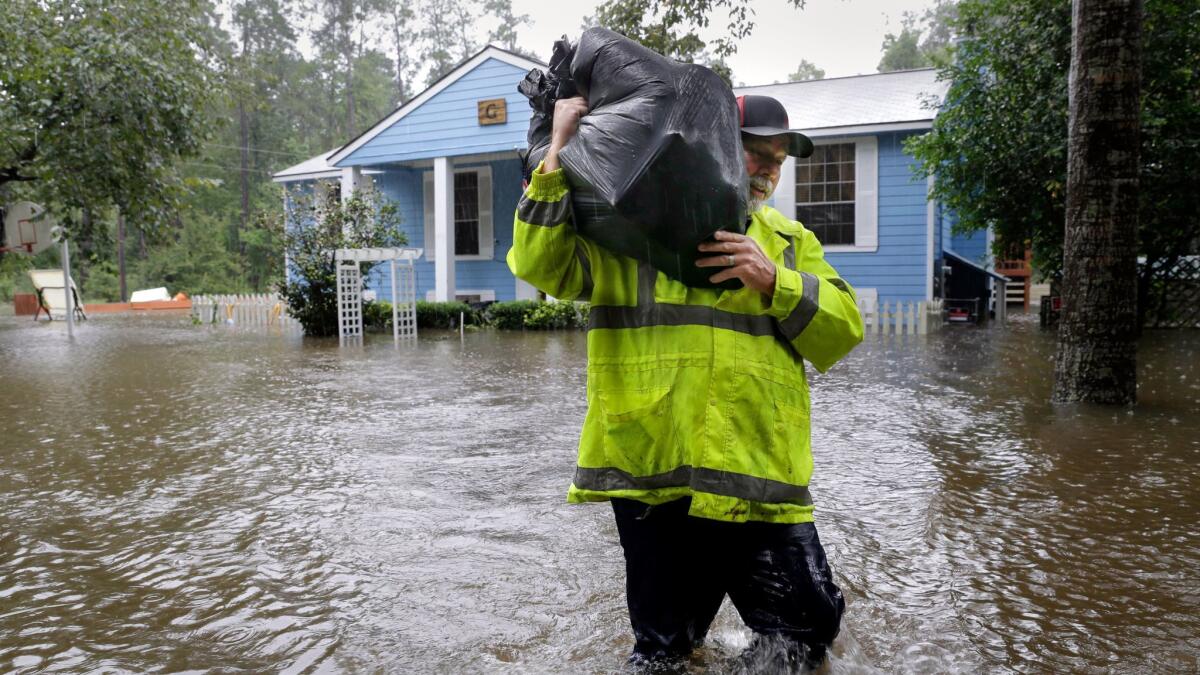Op-Ed: Disasters like Harvey and Irma show how lawyers’ stodgy rules kick Americans when they’re down

- Share via
My house burned down in the Oakland firestorm of 1991, along with almost 3,000 others. I and my husband at the time lost everything we owned that wasn’t in our car, but we considered ourselves fortunate: Our 17-month-old son and his paternal grandparents survived. They were driven to safety by a neighbor minutes before our house burst into flames. Twenty-five people died in the firestorm, two at the foot of our driveway.
We would feel the effects of the fire for months. We had to find a temporary place to live with a toddler when thousands of others were looking and rents were skyrocketing. We had to decipher insurance policies, file and contest claims. We had to figure out whether to rebuild, and when. And we had to do all this while juggling work and disrupted child care, continuing to pay bills even though the stuff we were paying off was now a pile of ashes. Still, we were lucky. As law professors, we had financial and legal resources to meet these challenges.
Most people hit by Harvey and Irma don’t have these means. And in many cases, they are navigating overwhelming loss under far more complicated circumstances — with no income, no healthcare, child support obligations to meet, even vulnerable immigration statuses. In their efforts to stay afloat in this very different kind of flood, the vast majority of Harvey’s and Irma’s victims will have almost no access to legal help.
Aware of the legal crisis Harvey has left in its wake, lawyers in Texas have joined the ranks of first responders. Legal aid services have set up booths in shelters to provide information and advice. Attorneys across the country will also be able to help. Under ordinary circumstances, they wouldn’t be allowed to: Like every other state, Texas has a rule that only in-state lawyers can provide legal services to Texans. But after Harvey, the Texas Supreme Court issued an emergency order to temporarily allow out-of-state lawyers to provide pro bono assistance to hurricane survivors.
Lawyers defend their rules as ethical requirements, but they’re not.
This is a welcome dispensation, but it also raises a question: Why limit this benefit to the aftermath of Harvey? Large-scale catastrophes may hit hundreds of thousands at once, but just as many are hit by personal disasters requiring legal help every day.
At any given time, as many as two-thirds of all American households are facing at least one problem that requires legal assistance — eviction, the need to pay or collect child support, a health insurance problem. On average more than 85% of these households get no legal help, according to surveys conducted in several states.
The reason is straightforward: Legal services are expensive. The average rate of noncorporate lawyers in this country is between $200 and $250 an hour. That’s a nonstarter for most Americans, many of whom can’t cover $400 in unexpected expenses. Very few people with legal problems will get government-funded legal aid or help on a pro bono basis. Only 1% of all lawyers in the U.S. work for legal aid providers, and the average lawyer devotes less than 3% of her hours to pro bono work.
Legal services are expensive partly because lawyers are highly trained professionals. But there is another, less obvious factor: Rules like the one in Texas prevent the legal market from bringing down costs.
Lawyers create these rules through bar associations and get them adopted by state supreme courts. The rule against out-of-state lawyers, which has been put in place by courts in every state, introduces a barrier to entry and helps to limit economies of scale.
It’s not the only example. For instance, there are rules that lawyers cannot be employed by, or enter into investment or contracting arrangements with, companies or organizations that are not owned by lawyers. Attorneys claim this is necessary to ensure that lawyers serve the interests of their clients rather than the profit motives of investors. But it means lawyers can’t partner with entities that have business expertise or the capacity to invest in technology and consumer research — things that might bring costs down. It also means that anyone looking to develop a new legal technology — a phone app that helps people file for benefits or interpret legal documents, say — cannot accept investment from venture capital firms.
These rules introduce significant inefficiencies into the market that serve no one, not even the lawyers. By my calculations using census data, many lawyers who charge $200 or more an hour only net $35 to $40 an hour. A recent study on the billing data of lawyers at small law firms found that, for an eight-hour day, they collected payment for about an hour and a half of work.
Lawyers defend their rules as ethical requirements, but they’re not. There are other ways to maintain legal ethics that would not radically limit the market. Fine out-of-state lawyers who give advice without adequate knowledge of local rules, for example, and make them hold malpractice insurance. This is how it’s done in the United Kingdom.
If American lawyers really want to help people who are hurting, they should start by fixing their own rules.
Gillian K. Hadfield is a professor of law and economics at USC and the author of “Rules for a Flat World: Why Humans Invented Law and How to Reinvent It for a Complex Global Economy.”
Follow the Opinion section on Twitter @latimesopinion or Facebook
More to Read
A cure for the common opinion
Get thought-provoking perspectives with our weekly newsletter.
You may occasionally receive promotional content from the Los Angeles Times.









